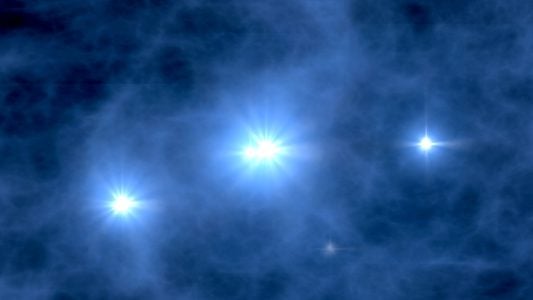
(Wikimedia Commons)
A quotation from astronomer and astrophysicist Seth Shostak, extracted from something that I read earlier today:
Ever since Galileo, astronomers have somberly charted a universe that is stupefyingly large, bitterly cold, and implacably hostile. As every schoolchild knows, we occupy a small planet around a common sort of star, itself just one of a hundred billion suns in a rather ordinary galaxy. Our cosmic situation is insignificant, and life, particularly intelligent life, might be only an accident of circumstance on one tiny, watery world. Indeed, we have yet to discover whether even a single other celestial body has managed to spawn the simplest biology.
In other words, we might be tempted to judge from current evidence that life is no more than an occasional consequence of nature’s laws, a chance product of the chemistry that those laws allow. Intelligence, which has emerged only recently on our planet, might be even rarer In this view, the appearance of life seems if not miraculous, then at least highly unlikely.
But there is something wrong with this picture. As our understanding of cosmology has deepened, we have been confronted with a disarming fact: it seems that the physical laws and constraints of the universe have been finely tuned for life. For example, the energy states of atoms are such as to allow the easy formation of carbon in the searing interiors of the stars, and to prevent this element from being quickly transmuted into yet heavier atoms. But there seems to be no compelling reason why these energy levels could not have been otherwise, resulting in a universe in which carbon — the key building block of complex molecules and therefore of life — was hard to find. The particulars of the Big Bang were also fortuitous. Had this initial event occurred with less force, the universe would have long ago collapsed on itself. With more force, it would have expanded too quickly to allow the formation of galaxies, stars, planets — and us. Again, it is hard to explain why, like Goldilocks’s porridge, the Big Bang should have detonated with a force that was “just right.” In the words of physicist Freeman Dyson, such apparent coincidences make it seem as if “the universe knew we were coming.”
Seth Shostak, “Foreword” to James N. Gardner, Biocosm: The New Scientific Theory of Evolution: Intelligent Life is the Architect of the Universe (Makawao, Maui, Hawaii: Inner Ocean Publishing, 2003), xix-xx.












